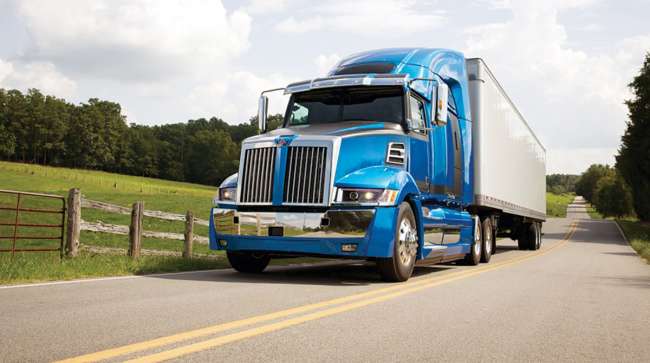Senior Reporter
Class 8 Sales Drop 10.4% in September

[Stay on top of transportation news: Get TTNews in your inbox.]
U.S. Class 8 retail sales fell 10.4% to 17,131 in September, WardsAuto.com reported.
Production once again could not meet stellar industry demand; most truck makers posted lower sales.
A year earlier, sales reached 19,126.
Through the first nine months, sales improved 22.2% to 163,683 compared with 133,921 a year earlier.

Research shows that 41% of technicians leave the industry within the first two years. Host Michael Freeze asks, how can technician recruiters and maintenance leaders decrease that percentage? We talked with Ana Salcido of Navistar and Stacy Earnhardt of TMC. Hear a snippet above, and get the full program by going to RoadSigns.TTNews.com.
In September, just the two smallest brands posted year-over-year sales gains.
Western Star, a unit of Daimler Trucks North America, increased sales 36.6% to 534 units compared with 391 in the 2020 period. That was good for a 3.1% market share.
Mack Trucks, a unit of Volvo Group, increased sales 18.7% to 1,566 compared with 1,319 a year earlier. It notched a 9.1% share.
DTNA’s Freightliner brand remained the market leader with a 39.1% share despite its sales falling 13.1% to 6,703 compared with 7,713 a year earlier.
Truck makers are building in unprecedented times.
One expert said scores of parts continue to be in short supply due to the coronavirus pandemic.
“There is the lingering impact of steel tariffs which have domestic steel prices well above other global benchmarks, and the February storm that incapacitated Texas and shut down swaths of the U.S. plastics industry for two-plus quarters,” said Steve Tam, vice president of ACT Research. “Aluminum extrusions are a challenge, wire is hard to find and tires have been mentioned since day one of the new cycle. And like the supply chains themselves, the issues are not only domestic and not only commercial vehicle. Semiconductors might be masking other component issues, but they are at the heart of the supply chain’s woes. Even as new ‘fab’ capacity is coming online this year and next, global automotive industry shutdowns continue.”

Tam
Peterbilt Motors Co., a unit of Paccar Inc., had the steepest decline, 28.9%, on sales of 1,910 compared with 2,686 a year earlier. It pulled down an 11.1% share.
Kenworth Truck Co., also a Paccar brand, posted a 6.3% decline in sales to 2,625 compared with 2,800 a year earlier. It notched a 15.3% share.
Paccar recently reported 7,000 deliveries in the third quarter were stalled, with trucks on the sidelines awaiting semiconductors.
International, a brand of Navistar Inc., saw sales fall 7.8% to 2,080 compared with 2,256 a year earlier.
Volvo Trucks North America, a member of Volvo Group, posted sales of 1,713. That was down 12.6% compared with 1,960 a year earlier. In September, it earned a 10% share.

Ake
Don Ake, vice president of commercial vehicles at FTR, told Transport Topics that September’s volume was “right in line with expectations since truck production is tracking in a narrow range due to component shortages.”
“It is expected that retail sales will remain around this level for the next few months. Truck dealers remain starved for inventories.”
There was a brighter outlook at VTNA.

Koeck
“We are seeing our retail sales rise for the second month in a row after the hit experienced this summer due to the strike at our manufacturing plant in Dublin, Va.,” said Magnus Koeck, vice president of strategy at VTNA. “We are still experiencing general supply chain constraints including semiconductors, along with the rest of the industry, and we believe this will continue to be the situation for the foreseeable future.
“The overall market will continue to be lower than anticipated, and it will take some time before we will see improved numbers.”
At Mack, growth is spurred by consumer spending, elevated residential construction activity and the recovery in the manufacturing sector as they remain the primary contributors to high industry demand, said Jonathan Randall, senior vice president of sales at Mack.

Randall
“Freight pricing is projected to remain strong because of the current economic outlook, so customers are investing in new Class 8 Mack on-highway and vocational trucks to help attract drivers and reduce their cost of ownership through greater fuel efficiency and Mack’s suite of uptime services,” he said.
And rate increases are expected to accelerate, according to investment firm Cowen Inc.’s third-quarter carrier survey.
Cowen found carriers expect rate increases in the next six months to be 5.1%, up from 4.9% in its second-quarter survey. “Contracts that carriers renegotiated in the last month averaged a 4.9% rate increase, up from a 4.5% rate increase in Q2.”
Participants in its survey this quarter accounted for more than 20,000 Class 8 trucks, according to the company.
Another of the survey’s findings underscored an increasing number of truckload carriers are planning to buy autonomous trucks.
Cowen asked participants who are open to testing autonomous trucks if they would either own the autonomous trucks or use a third party for autonomous capabilities.
Forty-eight percent of those participants plan to own autonomous trucks themselves in the next five years, up from 36% last quarter, while 52% plan to use a third party for autonomous capabilities, down from 64% from the second quarter.
Of the survey’s total respondents:
• 26% operate 26-50 trucks
• 21% operate 1-25 trucks
• 20% operate 101-250 trucks
• 17% operate 251 or more trucks
• 8% operate 76-100 trucks
• 8% operate 51-75 trucks.
Other truck makers either declined or did not respond to a request for comment.
Want more news? Listen to today's daily briefing below or go here for more info:




